Ahoy, squirts! Quint here with bit of World's End craziness to share. I was recently invited to take a trip over to London in order to get an up and close look at the first third of the pub crawl experienced in The World's End... oh, and to have lunch with Simon Pegg and Nick Frost. Who could say no? I didn't.
So, off I went to London knowing I was going to let down each and every other blogging geek on the pub crawl. I don't really drink, so I got to be Nick Frost. I was the one to order tap water when everyone else was having pints. And yes, there were cries of “You're drinking fucking rain?!?” mostly from Collider's Matt Goldberg.
I'm no teetotaler, I just never had a beer that I enjoyed. It's all good, though. Lord knows I need another vice like I need a dick growing out of my nose. Basically I was along for the ride, the sober dude watching a bunch of American bloggers get trashed enough to do stupid shit like recreate the shrub jump in the middle of Welwyn Garden City's town square.
The day began with a crowded bus drive up to Hertfordshire, which is perhaps the most British-sounding township I could imagine, and our first stop was, naturally, The First Post (aka The Pear Tree).
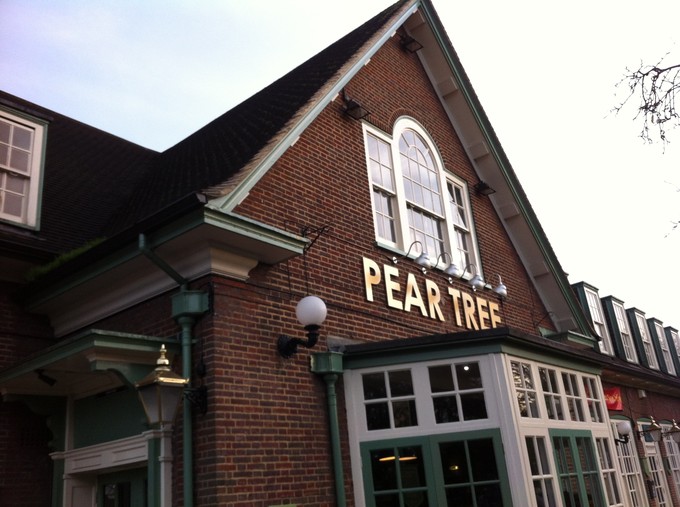
Walking inside I couldn't help but think the PR company hired all the drinkers within. It was mid-afternoon and the place wasn't exactly jumping, but a few regulars were about, mostly older people. A couple in their 60s sat in a back corner, a few 50s-ish men and woman sat alone with their pints, a gaggle of youths not unlike the first Blanks Gary King and his crew fight in the film were playing pool and a young child, presumably one of the pub employee's kid, sat at a table coloring, still in his school uniform. They all regarded us with confused looks as we walked in.
It wasn't quite the record scratch moment you see in movies, but you could tell they noticed this group of (mostly) American geeks walking in en masse and were surprised by our presence. Some of them actually slowly approached us like we were animals at a zoo. Curious, they inquired about why we were there and when we told them about the pub crawl in the film, they all started to think we were in the movie business.
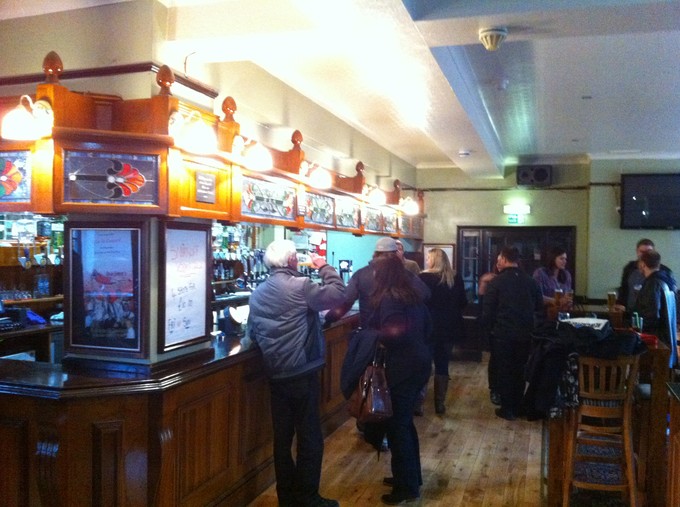
There was one guy in particular, an older fella named Larry, who was more than halfway into a state of drunken bliss and didn't understand the concept of a press tour. He thought we were scouting the pub for the World's End sequel. He kept wanting to make sure his name was in the hat to be an extra because he wanted some of that sweet Hollywood movie money. Larry repeated over and over that he had a mate that was an extra for a month in The World's End and made £20,000 and he wanted in on that.
Now his mate was either exaggerating or flat out lying about that sum, but I knew trying to convince him of this was a no-win situation and there was no point, so we just carried on having a good old fashioned drunken British pub conversation in which he told me how he once met Bob Hoskins and how rude he was. The story goes that my drunk friend's daughter had seen and loved Who Framed Roger Rabbit and the year after it came out Larry stumbled across a production filming and saw Hopkins, so he wandered right up to him to ask him for an autograph. Now, the intention was noble. He wanted the autograph for his daughter. But as he was telling the story I realized that he had walked right into the scene as they were shooting.
The way he told it, Hopkins got super pissed off “For fuck's sake, we're trying to work here!” but still signed a napkin to get him away.
Here's a shitty iPhone picture of me and Larry:
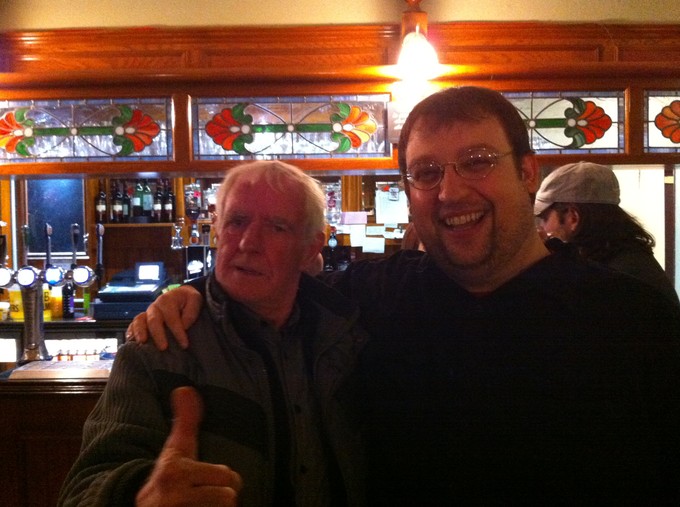
Not long after Larry's story we had to move on to the next pub, the inventively titled The Doctor's Tonic.
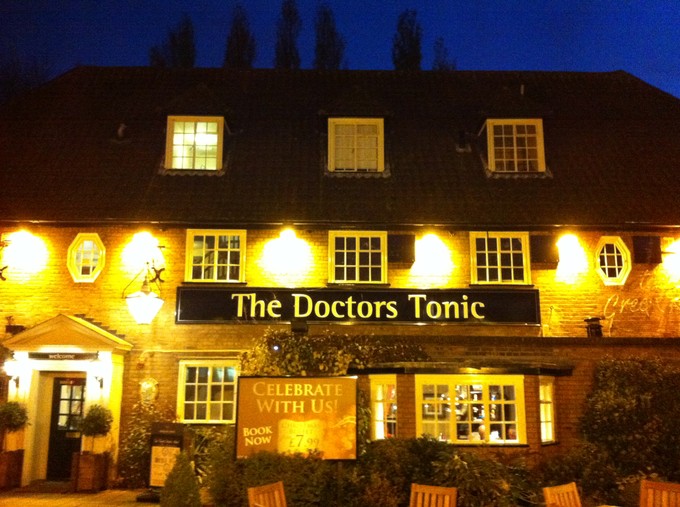
You'll remember this as being the exterior of The Old Familiar, which was indeed familiar. The whole point of this pub was that it looked exactly the same on the inside as The First Post. The interior filming was actually done at The Pear Tree as a way to satirize the commercialization of this faux rustic English Pub.
The rest of the pub was actually pretty nice, much more modern than The Pear Tree. The demo skewered younger and more hipstery, so I felt more at home. That's not to say The Doctor's Tonic didn't have its fair share of older regulars. In fact, I met one named Colin who ended up following us for the rest of the tour. He was drunk at The Doctor's Tonic, but by the time we rounded out the night at the Parkway Bar he could barely stand.
Colin had a big bag of bar tales (tall, short and every shape in-between), including seeing Jimmi Hendrix play in this small town once (this story started with “He played here” and evolved to “I was there” before it ended at “I played backup for him”).
The local color was actually kind of what made this tour special. It didn't feel like a junket (although it most certainly was one), but more of a tour package you might sign up for when traveling abroad. Welwyn Garden City was the quintessential small English town and the folks we met on our travels seemed right out of Central Casting.
The next stop was The Famous Cock, which is known in real life as The Two Willows (formerly The Cork).
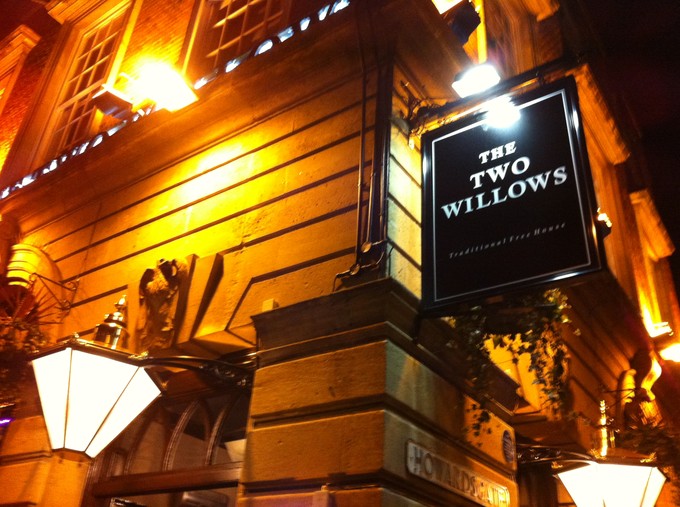
I didn't recognize much about this pub, which isn't a surprise because it went through a renovation post-filming, but they did have this nifty mirror that I'm sure has been the focus of many drunken photo ops:
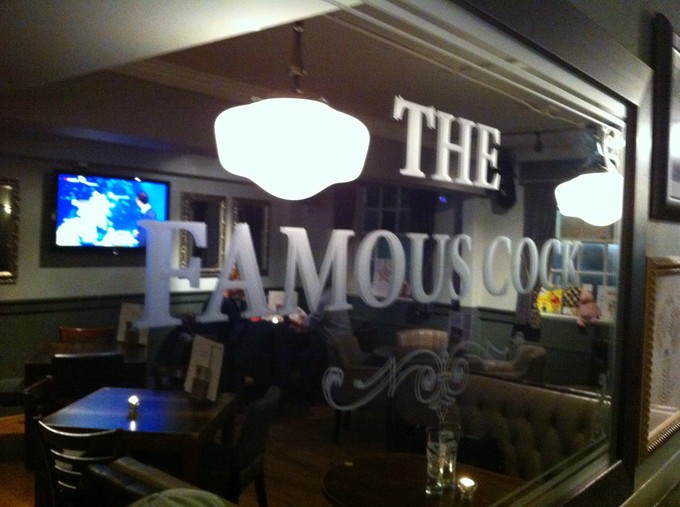
A short minute walk away was our final pub, The Parkway Bar, which plays a big role in The World's End as The Cross Hands, where the Blanks are revealed and the big bathroom fight takes place.
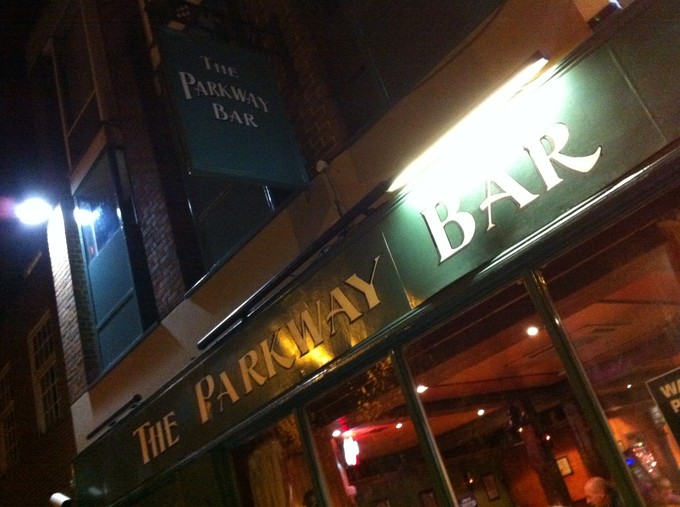
Sadly, the bathroom was not the one featured in the movie, which was quite a shock when you push open that door above and only see a tiny closet-sized piss trough. Movies are nothing but lies!
Colin had indeed followed us over to our final stop and at this point was pretty wasted and hitting on the ladies in our group. I saw the desperation in their eyes, so I went up and tried to distract him with some more music talk. He liked guitarists, so we talked about Eric Clapton and George Harrison and Stevie Ray Vaughn while the ladies slowly backed away. Colin tried to buy another round and was cut off by the no-nonsense bartender, so he bid everyone a fond farewell and stumbled home, which he promised was a short walk away and one he'd made a million times.
One other thing of note was that the jukebox system in The Parkway Bar had the opening credits of Labyrinth song as a selectable option. So, it was my favorite pub. Plus it's the one that looked the most similar to its cinematic equivalent.
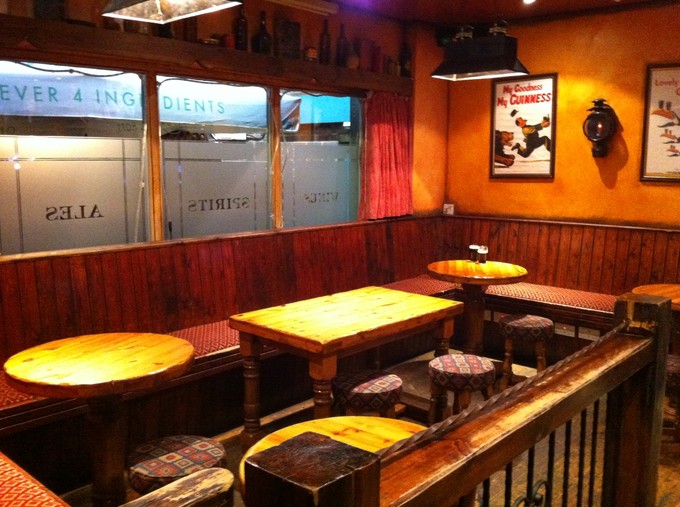
The next day we were all gathered to have an informal lunch with Simon Pegg and Nick Frost. It wasn't supposed to be an interview roundtable, just a casual hangout with two actors who also happen to be of the “one of us” geek flock.
The biggest memory of that lunch I have is that I floated a question about the limits of the Cornetto Trilogy Universe and just how much overlap there is. For instance, do all the Cornetto films exist in one complete world? Does that mean that Shaun and Ed and Angel and Danny exist in The World's End? I like to believe they do, but Simon and Nick didn't give a definitive answer. Nick did say that if they did he's sure that Angel and Danny would have arrested Gary King at some point before we see grown up Gary in The World's End.
I won't bore you by recounting the rest of my London trip, which included visits to Abbey Road, The British Museum and 221b Baker Street, don't worry, but I do want to get to the real meat of this piece, which is an in-depth, spoiler-filled conversation about The World's End with Edgar Wright, Simon and Nick.
We cover a ton of ground with this interview, especially when it comes to the decisions surrounding the direction of the ending and why they went the way they did.
Enjoy!
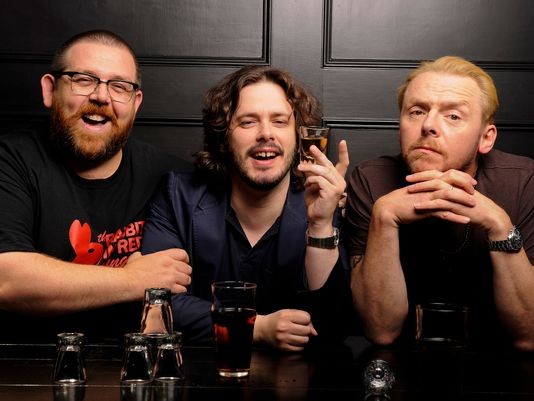
Edgar Wright: Now, you were one of the only few who came onto the set.
Simon Pegg: It was the Hole In The Wall day, wasn't it?
Edgar Wright: We had very few visitors. I think there was only one day where we had press on the set.
Quint: I remember they were describing the complexities of the set they built for the actual World's End pub. “This is going to spin and then a hole is going to open up in the floor!” I was like “... what?” Because you guys were being so tight-lipped on that visit. You wouldn't even tell us what the threat was.
Simon Pegg: (laughs) We were holding our cards very close to our chests then.
Quint: It must be a very difficult line to walk, finding the right spots to release information. I remember being surprised at how much was in the trailer, for instance.
Edgar Wright: With trailers it's a necessary evil of marketing. You've got to show some bang for your buck. A couple of people said, “Why don't you just have the trailer make it look like a pub crawl movie and then the audience will be surprised...” Because then 1/20th of the people would show up!
A, there's a lot of secrets to the film that are not in the trailer and B, the film is really about the emotional journey. I think that's why some people are so unsatisfied with summer movies that do show all the big moments in the trailer is because there is nothing else. If there's something like an emotional arc or some kind of character elements you're not expecting, that's what the movie's about. That's never going to be spoiled in a trailer.
Quint: I remember when it used to just be movie geeks bitching about trailers showing too much, but I'm now hearing average theater goers comment “Well, I guess I don't have to see that movie now” after some trailers.
Simon Pegg: Sometimes that's the case, but as Edgar says you have to give over something. I got a few people on Twitter saying, “Why did you put so much in the trailer?” You can't say to them, “Well, it's not” because there are people who are once bitten twice shy. They've seen that kind of thing before. It's difficult. Marketing is an absolute puzzle these days.
Quint: I miss the old days of the teaser trailer... I love teaser trailers. The Kubrick Shining trailer, the American Werewolf in London teaser, the great Terminator 2 teaser trailer...
Edgar Wright: But those are extremely rare. Even back then they were pretty rare. The only reason they're quite memorable is they're one in a million, those things.
Simon Pegg: Trailer-making has become something of an artform itself. You look at some of the older trailers and they're really sort of ham-fisted and weird. Like the trailer for Star Wars is sombre! I'm surprised anyone went to see that movie.
Nick Frost: But it had a great voiceover!
Simon Pegg: Yeah. And the trailer for Carrie shows the whole last scene in it.
Nick Frost: Don't tell me, don't tell me!
Edgar Wright: You could ruin the Carrie remake by watching the original Carrie trailer!
Simon Pegg: But we had to sort of set up our store. We decided to put the fence gag in the trailer because it was in the Hot Fuzz trailer and we wanted to sort of make a link with the other two films. And it's not the funniest joke in the film anyway, so it was something we could give away in order to get people in.
Quint: I take it the fence gag itself will be a cornerstone of the Cornetto Trilogy and you won't carry it over to any further films the three of you make together.
Edgar Wright: That's it.
Simon Pegg: Yeah, we won't do that. We won't have to.
Nick Frost: Unless we remake The Swimmer.
Edgar Wright: We just remade The Swimmer, it's called The World's End! I think one of the things we wanted to do with this movie, since people wanted us to... Well, not just people wanted us to do a third film, we wanted to do a third film, but when we came upon the idea for this story, which we did back in 2007, the emotional story is what got to us. In fact, the genre element kind of came out of the emotional arc.
With Shaun of the Dead we set out to make a zombie film, with Hot Fuzz we set out to make a cop film, but with this one the genre came about as a way for us to find a metaphor for how we felt about our hometowns. We all had the experience of going back to our hometowns and finding them somewhat different. I think everybody has that. Did you grow up in Austin?
Quint: No, a little town in the Bay Area of California.
Edgar Wright: Well, even if you still live in the town that you've grown up in there's still school reunions and weddings, things when you kind of reconnect with people you haven't seen in a long time. We liked this idea of taking it very literally that when you go back to your hometown sometimes you feel alienated. I wanted to use the sci-fi element to make the metaphoric element extremely rich. In a way, much like Gary, it's somehow more comforting to think that it might be some kind of galactic interference than to think of the fact that you're getting old and guess what... shock, surprise, your hometown was shit in the first place. It's almost too horrible to bear because you have this nostalgia for it.
So, in the movie when Gary hits upon what the problem is he's actually happy.
Simon Pegg: It's a relief to him.
Edgar Wright: Yes, he's smiling and relieved when it's something else because he wasn't happy about the idea that people didn't recognize him and the town had become boring. When he finds out it might be otherworldly, he's actually happy about it. I've never seen that in a movie, where the hero is actually happy that it is aliens.
Simon Pegg: And then he actually uses it as a reason to carry on. The guys are so lost and shocked and Gary is so single-minded in his pursuit of drinking that he actually adopts the problem as a way of keeping the boys on the crawl.
Edgar Wright: He's got a captive audience.
Simon Pegg: They've got no better answers, so they go along with him. He manipulates them. It's a measure of how selfish he is that he puts them all in danger just so he can finish the crawl.
Nick Frost: But he's also incredibly smart and proactive. He makes that decision immediately. “This is what we're going to do.”
Edgar Wright: Yeah, we always thought of him as the Tasmanian Devil. It's very easy to get caught up in his tailwind. He's so full of shit, but he's so propulsive. Pub crawls themselves there's always that sort of march or die aspect to it, so if you're embarking on a pub crawl you're pretty much saying to yourself, “I'm going to get absolutely obliterated tonight. My goal is to get black out drunk.”
Simon Pegg: People always underestimate addicts. We had a friend who was a heroin addict and people have this idea of heroin addicts as being these kind of doped up lazy do-nothings, but he would get up in the morning before we all woke up, get a train to Glasgow, this was at the Edinburgh festival, score, come back, shoot up and be all nice and sorted out before we even woke up. That took an incredible amount of organization.
Nick Frost: And he'd do it twice a day!
Simon Pegg: That's right. And we never knew about it because he was so fucking organized that he could get it all done. That's Gary. He's on it. Even though he's a mess, he's on it because he's driven by something which is more powerful than him.
Nick Frost: Being that, it's fucking tiring to be thinking about all the time. “It's 9am, so now I can get to this place and have a drink and then do this...”
Simon Pegg: We avoided picking the genre first this time because the most asked question on the Hot Fuzz press tour was “You've done zombies, you've done cops, what's next?” We weren't exactly shaken by that, but we didn't want to be the guys who just do genre riffs. We hoped there was more to Shaun of the Dead and Hot Fuzz than that.
We thought up this story before and it sort of leant itself to science-fiction because that's the only way a whole town could really change. It became that organically, but we didn't sit down and think “this one should be science-fiction! What should it be about?”
Edgar Wright: What's nice about these foes as well is that they can talk and can be tempting. There's so much fun that you can have with the idea of identity. A good scene that would illustrate it would be the scene with the school bully. That exact situation has happened to me. I came back to this small town, I saw the school bully in this bar and he completely blanked me. I was bemused and somewhat angry at the fact that he didn't recognize me. Of course, I didn't want him to recognize me and go “Hey, Wright!” and push me up against a wall or something while I was in my mid-20s...
Nick Frost: You would have killed yourself.
Edgar Wright: It would have been humiliating, but there's something more hurtful about him blanking me, “blank” being the operative word.
Simon Pegg: Peter's speech about that, what he's annoyed about is that it all meant nothing. Despite the fact that we sort of say nostalgia's a bad thing if you have too much of it, the past means everything. That's where all your emotional parameters are set as a kid. The fact is, as soon as the guys start drinking within three pubs they've fallen back into their old roles. They're like they were as kids. The more they get blue on them they kind of regress. Edgar always said it's like when you would come home from school and be covered in ink. The old hierarchy took over. Gary becomes the leader, Andy's the wingman in charge, Stephen's the pretender to the throne, Peter's the little subservient one... They fall back into their old roles.
Nick Frost: I was thinking the way the blanks are put together, with snap in place limbs, they're essentially fighting toys.
Edgar Wright: Yeah, they're fighting their childhood toys.
Simon Pegg: Like action figures.
Edgar Wright: I think even in the script, in the stage directions, it says “They break apart like action figures.” You twist the heads off, you break the arms off, and they'll keep coming.
Simon Pegg: Whoever this is up there, because it could be a thousand planets, we don't know, whenever they would arrive somewhere and they set up this indoctrination program and they create replicas of whomever they're taking over, but they don't put them together that well because they never come up against such obnoxious aggression. The human race is the first species that just kick them back, like we do. That's why they aren't particularly good at staying whole things.
Edgar Wright: With old sci-fi I used to get fascinated by the idea of replicants and exactly how they work. Like Yul Brenner in Westworld. You see him with his face off and you'd think “I wonder what the rest of him would look like.” Me and my brother, Oscar, did the designs for the blanks and we thought of their insides as being like Easter Eggs. When you get an Easter Egg it has so much promise. “Oh my God! A solid chocolate egg! Oh no, it's just a shell!” Even though that's still a lot of chocolate that initial disappointment is there.
Quint: “It's air!”
Edgar Wright: “It's just air inside!”
Simon Pegg: We had the idea that most of their stuff was in their torso... their brain, their nerve center... Everything else was just sort of hollow with this blue bio-fluid running through them.
Quint: What's really interesting to me is that you don't really paint the invaders in a bad light. As far as occupiers are concerned, they're not all that bad. As far as the blanks go, with the epilogue you get a real sense that the original personalities of the people replicated are still there.
Edgar Wright: That's what we liked about the ending. You've got the survivors and the traitors that survived as well. There's even the idea that humanity is starting to infect the blanks as well. They're not going to integrate into society because they have no other option.
Simon Pegg: It's also the idea that maybe what was trying to foisted upon Earth wasn't a terrible thing. Maybe we do need guidance, maybe we do need a parent figure or higher power, to adopt AA speak, to put us in order and help us realize our potential and not be terrible fuck ups, which we kind of are. We're a destructed, aggressive species and we're not really helping the environment we're in and we're constantly fighting each other. Maybe it'd be a good thing if there was some homogenizing force that straightened us all out, but that would be at the cost of free will.
Gary basically stands up for the right to be a dick. Is that a good thing?
Edgar Wright: Everybody sort of knows somebody like Gary King. Usually what happens in real life is the high school rebel very quickly gets a job in a factory and is beaten down and is just like a normal guy, but we liked the idea that Gary King has never given up on the teenage dream of being the one to flip the bird and tell teachers to go fuck themselves...
Simon Pegg: Apart from Mr. Shepherd.
Edgar Wright: Yes, apart from Mr. Shepherd. Look out for a line early on... in the opening scene we say, “Mr. Shepherd was definitely one of the good guys.” (laughs)
So, when you meet that person who is trying to be the rebel at 40, it's pathetic. The whole film is almost like a nice, big shaggy dog story to get Gary to that place where he CAN be the rebel forever. He can be the eternal rebel.
Simon Pegg: He's the legend he always thought he was.
Edgar Wright: Hopefully there's a nice kind of cyclical nature to it. At the start of the movie, Gary is waxing lyrical about his past and maybe romanticizing a bit. You're never really sure what you're seeing at the start of it is a highly romanticized version of events. In the same way, I'm sure when I've told Simon and Nick my story of being drunk at 19 I've embellished it more and more each time.
Nick Frost: He always ends up sounding like Oscar Wilde...
Edgar Wright: I know! It's kind of like that old Eddie Murphy routine about the man being run over by the ice cream truck.
Nick Frost: How could you have afforded a helicopter?
Edgar Wright: (laughs) What we like is to get to that point where other people start to feel wistful about the past, do you know what I mean? What we love to do, especially with this movie, is to not come down hard on either side of the argument. Deep down all of us probably want to be a bit like Gary and go off the grid and be like Dennis Hopper and Peter Fonda and ride off into the distance. Then on the flip side we like our Apple products and we like our Starbucks coffee and that's totally cool.
Simon Pegg: There's not prescribed kind of message, really. It's totally up for debate to leave it as it was or rebel against it.
Nick Frost: Plus if it was done correctly we'd never know.
Quint: Some people read the ending as dark, but what I love about it is that it's actually the happiest possible ending... for Gary, anyway.
Simon Pegg: Absolutely, yeah.
Quint: Probably not for anybody else on the planet, but Gary's cool.
Simon Pegg: Yeah, he's got his friends...
Edgar Wright: I've said this, and I mean it, I think actually The World's End has the happiest ending of the three. In Shaun of the Dead, his friend... whilst they might be able to play Playstation forever, he's still a completely zombified...
Nick Frost: He's dead!
Nick Frost: He's a dead man. In Hot Fuzz they have become fascists at the end of the movie! They've got black gloves and sunglasses on, the two of them, and they're living a Cannon right-wing fantasy. In this one, your character who is the most unhappy at the start... unhappy enough to be in a sort of a psychiatric hospital... is like a pig in shit at the end of the movie! (laughs)
Simon Pegg: With Shaun of the Dead, we already had that ending with Shaun and Ed in the shed before we had the meat of the film. With this, we had discussion to see if we could get Gary to go back in time, literally. Maybe there'd be some wormhole in the network center and he'd get sucked back in time to that night and he'd end up with his friends as they use to be. Because time travel is such a problematic story device...
Edgar Wright: It needed too much legwork to get there.
Nick Frost: They would have rejected you for being a horrible old bloke!
Simon Pegg: We didn't want it to feel like a cheat. That's what, in the end, inspired the idea of the network and how they could replicate people and make them young again. That enabled us to let Gary be with his young gang again at the end. That was the ending we wanted.
Nick Frost: My characters always have happy endings. Ed loves being dead. He never has to worry about getting a job...
Edgar Wright: He gets meat and Playstation.
Nick Frost: And he never has to figure out how to get weed. Danny's like a pig in shit because he becomes Hot Fuzz.
Simon Pegg: Andy ends up living organic, which is a callback to that conversation they have about organic food earlier on and then at the end he's living organic. There's also there's a funny thing, a line about Oliver being all mouth at the beginning and at the end that's all he is.
Edgar Wright: There's also the idea of all the adults, especially Nick's character, if you're a husband and a father you are the hunter/gatherer of the family. You're looking out for other mouths to feed and that's exactly what he's doing at the end. He's a farmer who's going to feed his wife and kids.
Simon Pegg: The point of the movie is the true measure of success is happiness. The fact is Gary just hasn't been happy to the point of trying to commit suicide. In the end, in actual fact it's like you said. It's the happiest ending. Andy's back with his wife and he's eating organic food. Pete's enjoying being with his kids, even though it's not the real Pete...
Edgar Wright: He's turned into a clown. He's actually entertaining his kids for once.
Simon Pegg: Yeah, instead of hiding from them. Stephen and Sam get together, which is what Stephen always wanted and Oliver is still doing his job and Gary's with his friends. In a sense, despite the end of the world, they all achieve a sort of personal happiness, which has to be seen as success.
Edgar Wright: The idea that at the start of the film Gary is the only one who misses the past, but literally one of the final lines of the movie is Andy thinking about the past. “I miss him.” It's taken the whole movie for him to admit he misses those days as well.
Simon Pegg: Also because the world has been sent back to the dark ages, Gary literally is living in past, which is what he always wanted to do.
Edgar Wright: It's interesting, actually, having now spoken to people who have seen it more than once. As people who like the other two movies know, there's a lot of foreshadowing. Some of it is more obvious than others, but even things like when they first see the town and he says, “Look upon it in its original colors for tonight we paint it red!” and it's literally this hellish red Biblical kind of apocalypse in the distance.
Simon Pegg: One of the things we learned from making Shaun of the Dead in the beginning of the DVD era, not even VHS, is you owe it to the audience to build films to bear up to repeated viewing. That's how people view films, they watch it again and again. And you can pause things and scrutinize like you never could before when it was simply a theatrical event which you might be able to catch in a lesser form on television later. You had to give everything straight away because it was usually a single watch.
I remember when I went to see Star Wars a second time it was such a big deal to see a film twice in a cinema. It was such a weird thing! Now our viewing experience has changed, our method of viewing has changed, so it's important for us as filmmakers to create the films like that.
Sometimes we'll put a punchline before a setup so you can only actually get the joke when you watch the film a second time because the first time you don't have the right information to get the punchline. Yeah, we're a bit anal is what I'm saying. (laughs)
Edgar Wright: For better or for worse we create movies where you can't get everything in one sitting. Mary and The Hulk from Shaun of the Dead bookend the movie. We don't draw too much attention to it, but we wanted the film to feel a bit more novelistic than the others. Shaun of the Dead is a bit more linear in a way. Just by having a prologue and an epilogue we wanted to have that kind of thing where you're dealing with the long lifespan of the characters.
The epilogue is one of my favorite bits in the movie because I like those novels and films where you suddenly find out a major information bomb in one sentence and it's like “Oh, my God, no!”
Simon Pegg: “Sam Beckett never returned home.”
Edgar Wright: In terms of a movie, one I absolutely love is the end of the Road Warrior. “We never saw him again.” After all that!?!?
Quint: The end of Conan the Barbarian, too. When you see old Conan on the throne. “He had many adventures... you're not going to see those, but he did.”
Simon Pegg: (laughs) Even something like Animal House where you get the little...
Edgar Wright: Well, that's from American Graffiti.
Simon Pegg: Oh, yes. Of course.
Edgar Wright: Funnily enough, I did a double bill at the New Beverly of American Graffiti and Animal House and John Landis came to introduce Animal House, but he watched the whole of American Graffiti. At the end of it, he came up to the audience and said, “I just want to apologize. I haven't seen American Graffiti since it came out and we used to make such fun of it on the Animal House set. We'd say, 'That wasn't the '60s, this is the '60s!' Now I just want to say that is an amazing film and I feel guilty about doing that spoof at the end of Animal House.” He was serious.
I think the ending of American Graffiti is like BANG! Two of them are dead. Ouch. It's the most brutal ending in a film where you've invested in these people and where are they now. It's two of them that are dead, right? Charles Martin Smith and Paul Le Mat are both dead. And one of them's a draft dodger, Richard Dreyfuss moved to Canada.
Simon Pegg: With each of the films we've done an epilogue... there's 6 months after Z Day and then there's Angel and Danny in their fascist utopia, but with this film it was nice to give it a prologue as well.
Edgar Wright: “Fuzztopia.” It'll be a theme park.
Simon Pegg: But it's kind of a fable as well. We wanted it to be a quest movie as much as a science-fiction film.
Quint: Before we wrap up can we talk a little bit about the writing process on your films? I know Simon and Edgar work closely, but I'm curious how much involvement Nick has throughout the process.
Edgar Wright: In the case of this one, we had a story idea which was a combination of an old script that I had written. The first three minutes are about the teenagers, which was pretty much the script I had written. Simon and I basically write the script and then Nick is always the first person to see it. I think we talked to you about the idea of what the character of Andy was before we'd finished the screenplay. What's interesting is I think Andy is more like you are now whereas Ed was more like you were during the making of Shaun of the Dead.
Nick Frost: A question we got asked loads during Shaun of the Dead was “So, how did you prepare for this role?” It was like, “That was me! They were my own clothes I got to wear to work!” At the end of the day I took those shorts off and put my own shorts on. To get to play a 40-odd something man with a wife and children who is quite serious... if this film says anything it's that you have to grow up. It's important to grow up and my 30s did that to me. It made me grow up pretty quick. Andy is a lot like me now. I don't think I have that internal rage and I don't have a beef with Simon. Well, we have a little brisket, but we don't have major beef. But I love getting involved and getting the script. It makes me feel lucky that I have a chance to read it before anyone else.
Simon Pegg: There's no one we write better for than Nick because we are friends first and foremost. When Edgar and I come together to write the first character we think of is Nick's character and we can write in such a way that Nick reads that and go, “Yeah, that's it.”
So, we'll have our first creative meeting, get all our ideas down on paper. We start very broad with a big flip chart and it gets more and more specific. It starts with a flip chart and then gets down to Final Draft and then we get down to punctuation as we try to get it down to five hundred pages...
Edgar Wright: I'm sorry, did you say five hundred pages? That's the Magnolia script! (laughs)
Simon Pegg: Sorry, 105 pages, I meant. But when we give it to Nick, it's like “There's the skeleton. You provide the flesh.” We give Nick the script and he will not only augment his own character, but he'll be an objective voice on the script for us as well because we respect his criticism above all others. So, he'll say, “This is good, but you need a bit more action here...”
Nick Frost: Or not. I do a big notes pass on the script and it's to them if they want to use some of them or they don't.
Quint: Does it hurt your feelings when they don't follow your notes?
Nick Frost: “Ummm, no.”
Edgar Wright: When we go, (high pitched impersonation of his own voice) “No!”
Nick Frost: (His version of Edgar): “Ummm, no.” (everybody cracks up)
Simon Pegg: You can't take that personally.
Nick Frost: I'm a producer on the film, too. I have a job to do and those cigars are not going to smoke themselves! No, if you're going to be pissed off and upset whenever someone rebuffs some of your ideas then you're in the wrong game.
Edgar Wright: We also rehearse with the actors and Nick also comes in there as well. We don't improvise on set at all, especially on this one. We had maybe a week less than Hot Fuzz to shoot the movie...
Simon Pegg: I think we had one improv moment on this one, which is when we're arguing in the car. Everyone came up with some lovely stuff.
Edgar Wright: I actually included all the takes on the Blu-Ray because it was funny just seeing people go off on one. But the thing that we do though is when funny jokes come out of (the rehearsal)... some of the really funny lines in the film were not in the first draft of the script...
Simon Pegg: Smashy Smashy Eggmen was not in it.
Edgar Wright: You two came up with that together, I think. That was a joint effort, that one.
Nick Frost: “Fuck it.” That was mine.
Simon Pegg: Yeah, Bill (Nighy) saying “Fuck it” wasn't in the script.
Edgar Wright: Yeah, yeah, yeah. I was resistant to that at first, but I'm glad we did it.
Simon Pegg: The original script doesn't have the fence gag in it. It has a version of it, but you weren't going to see it happen, which I think almost relied too much on the idea that people had seen the other two.
Edgar Wright: We'd storyboarded it. It was going to be off-screen, the fence gag, and then you were going to see the aftermath and that was the joke. When we were shooting one night we were just out of time. It was that thing where it was already 3 o'clock in the morning and we're not going to get that gag. Fuck it, it's not good enough anyway! But we did a couple of pick ups in the New Year after we edited that scene together and decided there needed to be something in there, but it has to be something different and we came up with the Buster Keaton-esque idea of the whole thing falling flat.
That said, even though there are some big laughs and little moments that are in there, if you read the screenplay for the film, even the first draft, it's astonishingly close to what we shot. As are the Shaun and Hot Fuzz scripts, strangely enough.
The World's End is now out on Blu-Ray by itself or as part of a trilogy set with Shaun of the Dead and Hot Fuzz.
Thanks for following along with my London adventure and for reading the big ol' interview with the boys. Hope you enjoyed it!
-Eric Vespe
”Quint”
quint@aintitcool.com
Follow Me On Twitter

